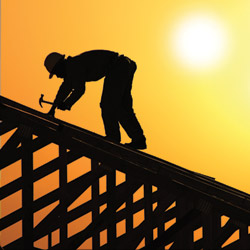
When you hear the word “union,” what’s the first thing that comes to mind? Unfortunately, the public at large may respond negatively to that question at first, associating the word “union” with picket signs, protests and strikes. It’s a fact of life that good deeds often go unnoticed, and that controversy gets air time and sells newspapers. Organized labor in this country and throughout the world is involved in an endless struggle for decent wages, safe working conditions, health insurance and pension benefits. These basic needs have always been with us, and the struggle to build and maintain a decent standard of living is becoming even more challenging in today’s global economy.
Organized workers who belong to unions will always have more opportunities than they care to have to protest, picket, and when all else fails, go out on strike. Organized workers are going to stand up for themselves and fight for a fair share of the fruits of their labors. That’s a given fact. Knowing this, and understanding that the public perception of our willingness to stand up and fight is often portrayed in a negative light, we consciously choose to balance the negative with the positive. We choose and encourage our union members to become active and positive forces in our communities.
This goal is accomplished both individually and collectively. Individual members give blood on a regular basis, and labor organizations regularly sponsor blood drives. A carpenter runs for St. Jude; a teacher is a Girl Scout leader; a labor organization mans the phone bank for the Children’s Hospital telethon. Union members run for school board and alderman positions, and labor unions are politically active in local, state and national elections. Together, our unions—and their members—are out there every day, making a difference.
We don’t just work here in central Illinois; we live here, too. We’re raising our children, sending them to school, and hoping they can land good jobs right here as adults. The issues and challenges that face our country—and our neighborhoods—are our issues, and we too will face the challenges as they come. If we didn’t believe that we are all in this together, belonging to a union would be somewhat hypocritical, wouldn’t it? A union, in its simplest form, is a group of individuals who band together to be stronger than they would be if they stood alone. That’s the premise that built this country, and it’s the foundation of any strong community.
I’ve been a so-called labor leader for over 20 years now, and one thing I’ve learned is that you can’t just be the guy out there with the picket sign. The community needs to know you and what you’re all about, or you will be labeled as the overpaid guy that’s never satisfied. Without a doubt, union members and labor unions have to be engaged and proactive in their communities. We need to weigh in on all the issues and dig into our own pockets to address our community needs. We also need to fight from time to time to preserve a living wage so we can provide for our families. Someone has to strive for and set a decent standard of living, and that’s a job that’s never quite finished.
I mentioned earlier that good deeds often go unnoticed. I wonder how many people have even heard of the Homeland Assistance Project, a program which began locally in May of 2003. For over six years, military families have been getting their home emergencies repaired free of change. The program is underwritten by local unions, contractor associations and labor-management groups. Military liaisons from the different service branches refer the families in need to us, and we dispatch a contractor to take care of plumbing, heating or electrical problems. So far, hundreds of families have been assisted throughout Illinois, and even a few out of state. The goal is to stand behind our military families here at home and take one small worry off their list.
Do you remember Christmas in April? The program is now called Rebuilding Together, and it was started in the Peoria area in 1994 by the Junior League and the local building trades unions. Now in its 15th year, Rebuilding Together has repaired hundreds of homes in Peoria, East Peoria, Peoria Heights and other surrounding communities. The program brings local businesses, city governments, hundreds of volunteers and the building trades together on the last Saturday in April to repair about 20 homes. The approach is a little different from Habitat for Humanity—and we know that because we are involved in that program as well.
I could go on and on listing different charities and community service projects in which the local unions and our members are involved, but that isn’t the point. The point is that this is our community, our state and our country. We are blessed to be living here, and as a result, we have some clear responsibilities as individuals and obligations to each other. The freedoms and opportunities we enjoy today were earned through the blood, sweat and tears of those who came before us. To be quite frank about it, we have been riding on the backs of that “greatest generation” for far too long.
We are at a critical time in the history and future of our country. We can’t afford to have anyone on the sidelines any longer. Unions and business, organized and unorganized workers have more in common than they do differences. We all need to come together and choose to become a powerful and positive force in our community. We need to lead by example as individuals first, and then we must tactfully begin to communicate that we expect everyone to pitch in and do their part. iBi

